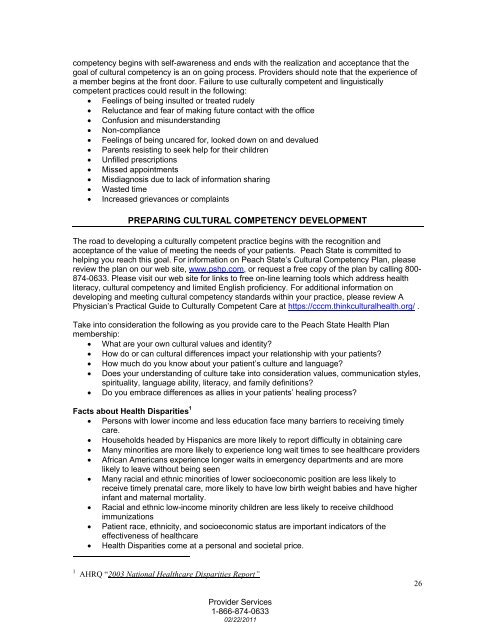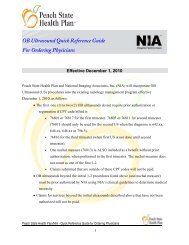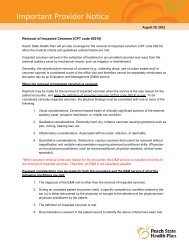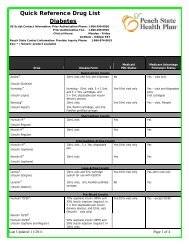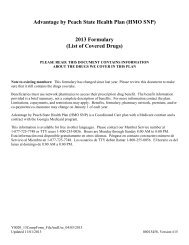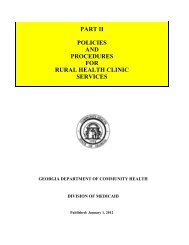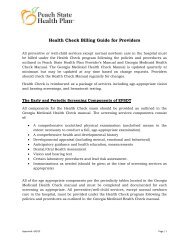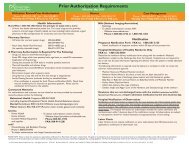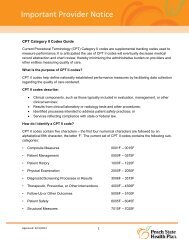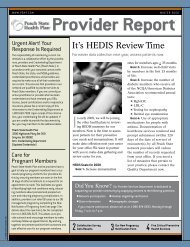Peach State Provider Office Manual - Peach State Health Plan ...
Peach State Provider Office Manual - Peach State Health Plan ...
Peach State Provider Office Manual - Peach State Health Plan ...
You also want an ePaper? Increase the reach of your titles
YUMPU automatically turns print PDFs into web optimized ePapers that Google loves.
competency begins with self-awareness and ends with the realization and acceptance that thegoal of cultural competency is an on going process. <strong>Provider</strong>s should note that the experience ofa member begins at the front door. Failure to use culturally competent and linguisticallycompetent practices could result in the following:• Feelings of being insulted or treated rudely• Reluctance and fear of making future contact with the office• Confusion and misunderstanding• Non-compliance• Feelings of being uncared for, looked down on and devalued• Parents resisting to seek help for their children• Unfilled prescriptions• Missed appointments• Misdiagnosis due to lack of information sharing• Wasted time• Increased grievances or complaintsPREPARING CULTURAL COMPETENCY DEVELOPMENTThe road to developing a culturally competent practice begins with the recognition andacceptance of the value of meeting the needs of your patients. <strong>Peach</strong> <strong>State</strong> is committed tohelping you reach this goal. For information on <strong>Peach</strong> <strong>State</strong>’s Cultural Competency <strong>Plan</strong>, pleasereview the plan on our web site, www.pshp.com, or request a free copy of the plan by calling 800-874-0633. Please visit our web site for links to free on-line learning tools which address healthliteracy, cultural competency and limited English proficiency. For additional information ondeveloping and meeting cultural competency standards within your practice, please review APhysician’s Practical Guide to Culturally Competent Care at https://cccm.thinkculturalhealth.org/ .Take into consideration the following as you provide care to the <strong>Peach</strong> <strong>State</strong> <strong>Health</strong> <strong>Plan</strong>membership:• What are your own cultural values and identity?• How do or can cultural differences impact your relationship with your patients?• How much do you know about your patient’s culture and language?• Does your understanding of culture take into consideration values, communication styles,spirituality, language ability, literacy, and family definitions?• Do you embrace differences as allies in your patients’ healing process?Facts about <strong>Health</strong> Disparities 1• Persons with lower income and less education face many barriers to receiving timelycare.• Households headed by Hispanics are more likely to report difficulty in obtaining care• Many minorities are more likely to experience long wait times to see healthcare providers• African Americans experience longer waits in emergency departments and are morelikely to leave without being seen• Many racial and ethnic minorities of lower socioeconomic position are less likely toreceive timely prenatal care, more likely to have low birth weight babies and have higherinfant and maternal mortality.• Racial and ethnic low-income minority children are less likely to receive childhoodimmunizations• Patient race, ethnicity, and socioeconomic status are important indicators of theeffectiveness of healthcare• <strong>Health</strong> Disparities come at a personal and societal price.1 AHRQ “2003 National <strong>Health</strong>care Disparities Report”26<strong>Provider</strong> Services1-866-874-063302/22/2011


